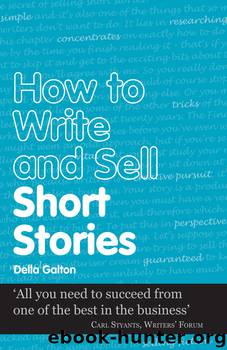How to Write and Sell Short Stories by Della Galton

Author:Della Galton
Language: eng
Format: epub
Publisher: Accent Press
Published: 2009-06-14T16:00:00+00:00
Chapter Eleven
Cutting and Editing
Murder your darlings
‘Murder your darlings’ was a phrase I heard a lot when I was learning to write. I was told it meant I had to cut all superfluous words and phrases from what I was writing, and that they’d often be the words and phrases I liked best.
It sounds awful, doesn’t it, and it is awful cutting out what you often feel are the best bits of your work. So why do we have to do it? Well, as I’ve gone further along my writing journey, I’ve realised that cutting almost always improves writing. I write short stories and I don’t have room for self-indulgence. The fact that I like or am proud of a particular phrase is not a good enough reason for leaving it in.
But all is not lost. If your beautiful phrase is essential to the story, then by all means leave it in – but be strict with yourself. Is it really essential? Is it moving along the plot? Is it developing the character? Is it actually in character viewpoint, or is it really authorial voice, i.e. are you throwing in the line because you think it’s good writing?
If you’ve asked yourself these questions and are honest about the answers and the phrase does indeed have to come out, then all is still not lost. Keep a separate document and move the phrase into it for future use. One day, you’ll have the perfect place for it.
This is actually one of the best tips I know for any cutting and editing. If you are cutting chunks of a story because your version is, for example, 500 words over the length it needs to be to fit the market, then just move the chunk – for now – to another document. If I’m working on a story saved on my computer as Changing Places, then anything I cut out of it will be saved as another file called Bits of Changing Places.
The beauty of this system is that it’s pain-free. I know I haven’t lost anything. If indeed I later decide I’ve cut the wrong chunk of a story, I can put it back. It continually amazes me that this hardly ever happens. My finished versions are tighter, better and stronger for the cut, and I am a writer who tends to underwrite, not overwrite.
For me, the moral of this story is that my writing always benefits from a cut. Try it on yours, you may be pleasantly surprised.
Are edits essential?
There are some well-established writers who say that edits are not essential – if we can write then we shouldn’t have to do it twice. We should, with practice, get it right first time.
For me, this is the same as saying I write perfectly. I know I do not. I don’t do anything perfectly, however much practice I have. I’ve been practising writing daily for the last twenty years and I have yet to perfect the art. My final drafts are not perfect either.
Download
This site does not store any files on its server. We only index and link to content provided by other sites. Please contact the content providers to delete copyright contents if any and email us, we'll remove relevant links or contents immediately.
Beautiful Disaster by McGuire Jamie(24406)
Trainspotting by Irvine Welsh(20088)
Call Me by Your Name by André Aciman(18997)
The Secret History by Donna Tartt(16670)
Cat's cradle by Kurt Vonnegut(13902)
Pimp by Iceberg Slim(12949)
All the Missing Girls by Megan Miranda(12779)
The Tidewater Tales by John Barth(12039)
Norse Mythology by Gaiman Neil(11904)
4 3 2 1: A Novel by Paul Auster(11078)
Scorched Eggs by Childs Laura(10813)
The Break by Marian Keyes(8615)
Adultolescence by Gabbie Hanna(8155)
All the Light We Cannot See: A Novel by Anthony Doerr(7826)
Where the Crawdads Sing by Delia Owens(7766)
A Man Called Ove: A Novel by Fredrik Backman(7679)
The remains of the day by Kazuo Ishiguro(7577)
Memorizing You by Dan Skinner(7427)
(2T) A Bone to Pick by Harris Charlaine(7318)
